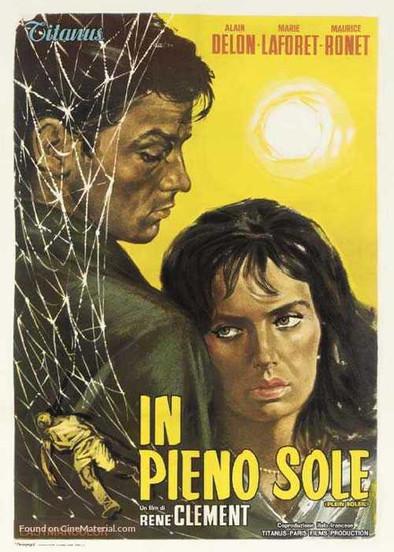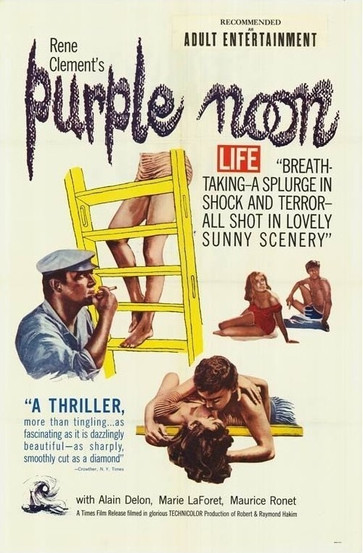"Plein Soleil", Dir: René Clément, 1960
- Ravi Swami
- Dec 14, 2020
- 4 min read
René Clément's 1960 adaptation of the Patricia Highsmith novel "The Talented Mr Ripley" was recommended by a friend and is one of many adaptations of Highsmith's work across theatre, television and film, the most well-known being Hitchcock's "Strangers on a Train".
The title literally translates as "Full Sun" but was re-titled "Purple Noon" for Western audiences, being a French language film - a title that takes it even further from it's literary source and something restored in the title of the 1999 Anthony Minghella remake.
None of the posters above really capture one of the film's main assets which is the evocative depiction a 1960's Italy of sun-drenched coastal towns and cities where the film is set
The plot takes some liberties with that of the book, mainly to make it acceptable to 60's audiences uncomfortable with references to homosexuality and more used to some element of romance, with the most marked deviation being the film's ending.
Available via BFI Player, I'd seen a synopsis of the film and while curious to check out films of the period and starring Alain Delon in particular it wasn't something that immediately stood out as something to watch and the picture of Delon sunbathing didn't help - it gave no real clue as to the genre or plot other than that it was based on the Highsmith novel and had been remade in 1999 - a film that also didn't particularly appeal to me at the time of its release even though it came highly rated.
I was pleasantly surprised to discover a gripping thriller in which Delon's smooth con-man Ripley concocts a plan to assume the identity of the wealthy playboy, Phillipe Greenleaf (Maurice Ronet). who he has been assigned to return to New York by the man's father, and where Clément audaciously opens the film with a scene where the two men enjoy breakfast outside a pavement cafe in Rome while Ripley blithely forges Greenleaf's signature on postcards, something that Greenleaf finds highly amusing - Greenleafs relaxed attitude to Ripley's aberrant behavior may have a gay subtext though it's never made explicit.
From that point onwards we follow Ripley as his plan plays out, leading to two murders and an attempt by Ripley to seduce Greenleaf's distraught grief-stricken girlfriend, Marge (Marie Laforêt) after siphoning off Greenleaf's fortune and whilst outwitting a police investigation.
What makes the film unusual is that, like the book, the focus of the story is Ripley and
although we get no insight into the psychology of his character apart from the fact that he comes from a poor background, we get to study him at close quarters as he conducts himself in his nefarious plan - there's something quite uncomfortable and unsettling about seeing him stake out his victims and the calculating and brutal way in which he commits the murders of Greenleaf and his friend Freddy Miles, by pushing Greenleaf's corpse into the sea off a yacht and dumping Miles' corpse in a ditch in Rome, respectively.
Delon is perfectly cast as Ripley - impossibly good-looking, he manages to charm his way into the lives of Greenleaf and Marge, disrupting their already shaky relationship in the process. The "talent" of Highsmith's title refers to the almost feral cunning of Ripley, an arch predator, something referenced in the film when a police inspector who is hot on the trail of the murderer tells Ripley that they both have a "canine" nature.
Highsmiths' novels often centre on characters who could be described as amoral or at any rate exhibit a kind of animal predatory nature, and the attraction / repulsion of scoundrels with retribution often absent. Highsmith herself studied Freudian psychology to manage her own conflicting feelings and many of the themes that underpin her work feature concepts that were in vogue at the time, referring to animal instincts and drives that may lie beneath the veneer of civilization.
In "Plain Soleil" Ripley's crimes eventually catch up with him in a horrible way but this is primarily to satisfy the audience craving for a satisfying ending where justice is served - in Highsmith's novel Ripley manages to escape justice for a high life with Greenleaf's money but is tortured by the fear that the police will come knocking one day, and is perhaps a worse fate and closer to real-life criminal cases where police investigations can span decades - this clearly wouldn't suit the framework of a film that is structured to play out as if in real-time, however.
In any case, although Highsmith herself was unhappy with the way the film ended, Clément delivers a brilliantly ambiguous ending where Ripley is called to a phone in a beach bar where he is languishing, unaware that it is a police trap, and the final shot is Delon exiting frame with a triumphant grin as the camera tilts away and upward toward the azure blue skies of the Italian coast, leaving one wondering if he has managed to outwit the police yet again.
Watch out for a very brief and uncredited appearance by Delon's future wife, Romy Schneider, at the start of the film.











Comments